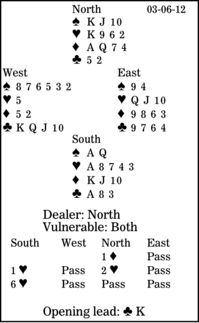Bridge column, March 6: Should you attack long or short?

We usually take for granted that if we need to cash some tricks in a side suit, the fewer cards we have there, the more likely we will get those tricks before an opponent can trump in.
That is true, but we must sometimes hang a question mark on our line of play.
In this deal, South reaches six hearts. West leads the club king. Declarer wins with his ace and draws two rounds of trumps, learning that he has an unavoidable loser there. How should he continue?
The auction was natural and reached a respectable slam.
Declarer's task was to discard his two club losers before East could ruff in and cash a club trick.
It looks normal to play first on spades, the shorter of two side suits that will provide pitches. But notice that this does not work here. East trumps the third spade and plays a club.
Yes, that is unlucky, but it is still the wrong play. For South to succeed, East must have at least three diamonds. And so declarer should start on that suit. If it proves to break 3-3, then he shifts to spades, hoping to find East with at least three cards there also. But when East turns up with four diamonds, South throws away one of his clubs. Then he needs to find East with only two spades, because when East trumps that third spade, declarer unloads his remaining low club.
** ** **
COPYRIGHT: 2012, UNITED FEATURE SYNDICATE
DISTRIBUTED BY UNIVERSAL UCLICK FOR UFS

